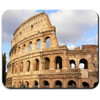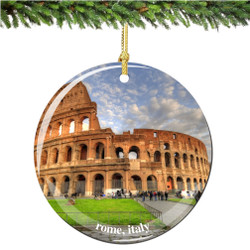
Desk Accessories
Rome's Coliseum Mousepad
$9.99
- SKU:
- NYC-COLMP
- Availability:
- Usually ships within 1 business day
- Shipping:
- Calculated at Checkout
Exclusive! Take a stroll down the streets of Rome to the ancient Coliseum with our photo design. This unique image showcases the historic Italian landmark set against a beautiful clear blue sky. Our mousepads are perfect computer accessories! Our Italian mouse pads make a great gift for yourself or someone you love.
Measures 9.25" x 7.75"
Coliseum Information: The Colosseum or Roman Coliseum, originally the Flavian Amphitheatre, is an elliptical amphitheater in the center of the city of Rome, Italy, the largest ever built in the Roman Empire. It is one of the greatest works of Roman architecture and Roman engineering. Occupying a site just east of the Roman Forum, its construction started between 70 and 72 AD under the emperor Vespasian and was completed in 80 AD under Titus, with further modifications being made during Domitian's reign (8196). Originally capable of seating around 80,000 spectators, the Colosseum was used for gladiatorial contests and public spectacles. As well as the gladiatorial games, other public spectacles were held there, such as mock sea battles, animal hunts, executions, re-enactments of famous battles, and dramas based on Classical mythology. The building ceased to be used for entertainment in the early medieval era. It was later reused for such purposes as housing, workshops, quarters for a religious order, a fortress, a quarry, and a Christian shrine. It has been estimated that about 500,000 people and over a million wild animals died in the Colosseum games. Although in the 21st century it stays partially ruined due to damage caused by devastating earthquakes and stone-robbers, the Colosseum is an iconic symbol of Imperial Rome and its breakthrough achievements in earthquake engineering. It is one of Rome's most popular tourist attractions and still has close connections with the Roman Catholic Church.
Special Links:







